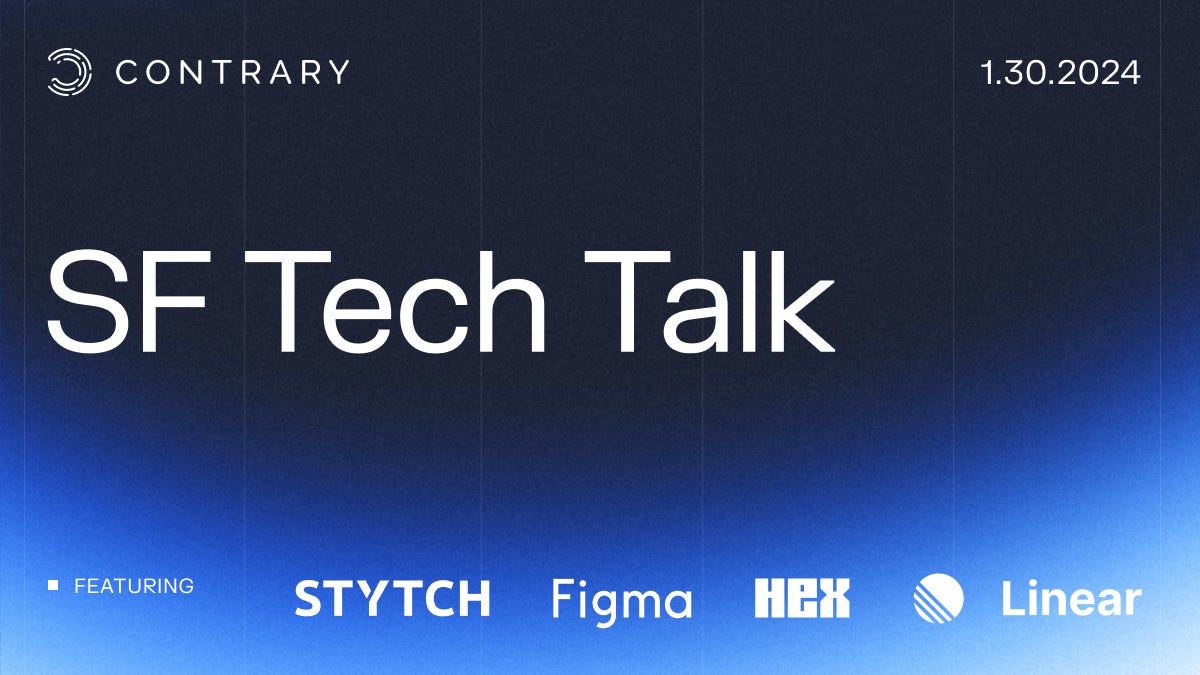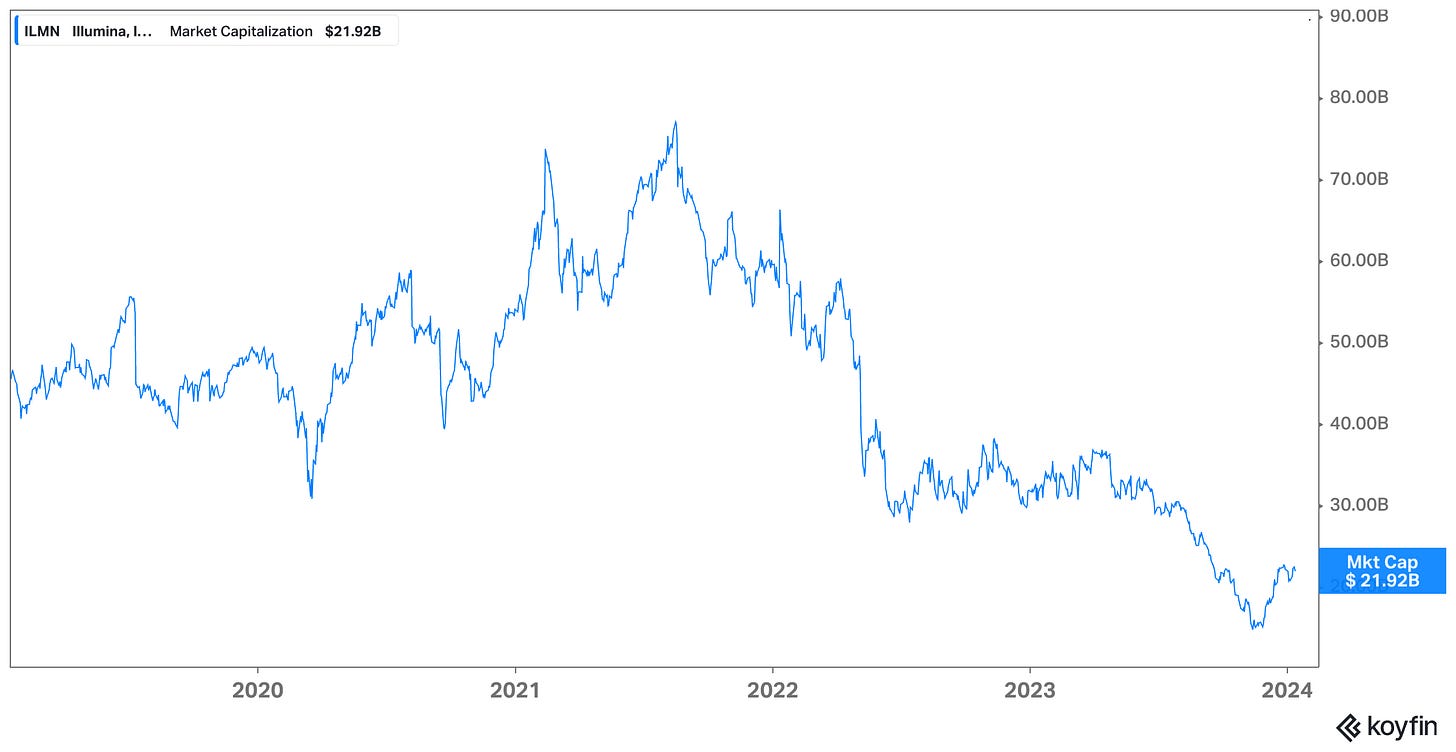Contrary Research Rundown #68
Looking for new frontiers in tech, plus new memos on Postman, Abnormal Security, and more
Register here for our next Tech Talk on Jan 30th, 2024, in SF - featuring founders & senior engineering leaders from Stytch, Figma, Linear, and Hex! Hosted by Contrary’s tech team, it’s an evening built by engineers for engineers — each company will live demo their latest features for leading builders in the Bay.
Research Rundown
Technology evolves in waves. Innovation drives adoption, and soon what previously only existed as science fiction suddenly becomes commonplace. We’ve seen this before with the internet, mobile devices, and now we’re increasingly seeing it with AI.

Similar to the waves within specific types of technology, there are also waves across particular industries. Often, the volatility in both asset prices and hype are counter-cyclical to when the most interesting work is done in a category. Coinbase was founded in 2012, but rode the hype waves of crypto in 2017 and 2021. OpenAI and Anduril were founded in 2015 and 2017 respectively, but are clearly riding waves of hype in AI and “American Dynamism” today.
Often, investors and talented people alike too frequently get caught up in tracking hype cycles, rather than cycles of technological progress. Think of the people who rebranded quite quickly from web3 in 2021 to AI in 2022. Instead, the most successful outcomes often occur in counter-cyclical periods of time.
Take one example of a potential wave that is, arguably, currently experiencing a downturn: biotech.
One of the best reflections of this is Illumina, a biotech company that operates in a broad swath of development and manufacturing to integrated systems across genetics and biology. The company’s market cap reached a high of ~$76 billion in 2021, before declining significantly over the last two years to ~$21 billion.
Despite the company’s performance, and the broader skepticism of the category, there are still significant opportunities arising in the category. Noah Smith describes it this way:
“We usually think of biotech as distinct from innovation in electrical and mechanical applications, but the two are beginning to merge. Computation is essential to modern drug discovery and chemistry in general, and AI looks like it’ll be another important tool. Meanwhile, biological experimentation is increasingly making use of robots in the lab.
But the biotech revolution that’s unfolding right now isn’t just downstream of those other technologies — it’s the result of decades of massive work and deep-pocketed investment that’s now coming to fruition.
MRNA vaccines, the heroes of the Covid pandemic, are now being applied to a ton of other diseases. A new mRNA vaccine for malaria promises to help conquer humanity’s most deadly chronic illness. And a new mRNA vaccine for pancreatic cancer — which you actually take as a therapy after you’re diagnosed, not before — promises to save a lot of lives from one of the deadliest cancers. Other cancers are probably also treatable this way.
Another technology that’s just now coming to fruition is genetic engineering, especially via CRISPR. The FDA just approved a drug that actually goes in and reengineers the cells in a living human body to treat sickle cell anemia. Other such drugs are in the pipeline. Genetic engineering is also proving useful for modifying bacteria and other organisms for useful purposes, such as producing fuel or fighting cancer. Of course all of this is in addition to the potential for reengineering the human species itself, but that’s still on the horizon.
A third major area of technology whose potential is still on the horizon, but could be realized in the near future, is synthetic biology. This year, scientists synthesized the DNA to make an artificial yeast cell. Synthetic biology could eventually be used to create all kinds of custom-built organisms to do various jobs.”
As powerful and attention grabbing as the latest hype cycle is, there is often more opportunities identifying those areas where fewer people are paying attention, but significant technological progress is being made. Even within AI, there are a myriad of use cases that aren’t getting the attention they deserve!
Postman was founded to simplify the API testing process and has expanded to address every stage of the API life cycle, from planning and design to implementation and testing to deployment and versioning. To learn more, read our full memo here and check out some open roles below:
Head of Marketing Creative - San Francisco, CA
Abnormal Security is designed to help businesses shield themselves from modern email threats like phishing, malware, and account takeovers. To learn more, read our full memo here and check out some open roles below:
Group Product Manager - Remote USA
Email Security Analyst Manager - Remote USA
Lattice is a people success platform aiming to make work meaningful and create winning cultures. Lattice’s product offering continues to expand into adjacent areas within HR technology. To learn more, read our full memo here and check out some open roles below:
Software Engineer - San Francisco, CA, New York, NY, Remote
Staff Product Manager - San Francisco, CA, New York, NY, Remote
Check out some standout roles from this week.
Voltai - Founding ML Research Engineer, Founding Software Engineer
Pallet | San Francisco - Founding Engineering Leader
After a tumultuous week, Carta announced the shutdown of Carta Liquidity, its secondary brokerage marketplace. We broke down the evolution of the Carta drama here. You can also learn more about Carta’s overall business in our memo.
Quora, founded by former Facebook CTO, and current OpenAI board member, Adam D'Angelo, announced it has raised $75M from Andreessen Horowitz to build out Poe, its generative AI bot creator. The company previously hasn’t raised capital since 2017.
Data provider Synaptic shared a report on open source in generative AI. “Github saw a 248% annual growth in Gen AI projects, with 60K+ projects in 2023. HuggingFace has 400k+ models.” From Mistral to Supabase, dozens of open source AI companies have seen meaningful traction over the last year. For more on the openness of AI, check our deep dive.
A Financial Times piece reported on the previously undisclosed meeting between OpenAI, Anthropic, and Cohere with academics and other Chinese state-backed groups. “Attendees said the talks allowed both sides to discuss the risks from the emerging technology and encourage investments in AI safety research. They added that the ultimate goal was to find a scientific path forward to safely develop more sophisticated AI technology.”
The original founding team of Instagram launched Artifact, a “TikTok for written content” app, just over a year ago. This week, they announced they were shutting down the app. “We have built something that a core group of users love, but we have concluded that the market opportunity isn’t big enough to warrant continued investment in this way.”











